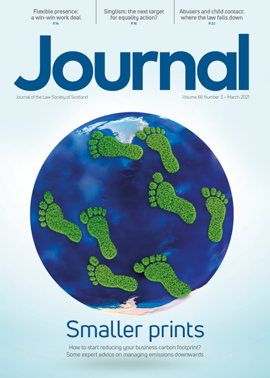Viewpoints: March 2021
Clubhouse: not so cool?
In last month's Journal, the “Tech of the Month” was Clubhouse, the new audio only social media platform, which was labelled “one of the coolest apps out there”.
However, for anyone, and maybe especially lawyers, joining Clubhouse should come with a very big caveat emptor.
As pointed out last month “the catch is, it's invitation only, so you'll need to know someone who's already signed up”.
Be warned, however, that the catch is a much bigger one than that. To give out an invite you have to share your entire mobile phone address book with Clubhouse. Clubhouse then creates shadow profiles of everyone in your address book who has not yet joined the Club. You are then pushed to invite them to join Clubhouse.
More worrying, perhaps, is the fact that this practice connects you with people you might prefer never to speak with again. If a former “friend” has your number in their address book and joins Clubhouse, then even if you do not have their number in your address book the app will connect you up and even suggest you get in a room together.
Clubhouse ignores GDPR. Getting on board before they curb these privacy violations might not be a cool look for a lawyer.
Brian Inkster, Inksters
Appeal for stroke survivors
Six years ago, completely out of the blue I had a sudden and life changing stroke. I'm not alone in this: stroke strikes every five minutes in the UK, and around 1.2 million survivors are living with its devastating effects. Yet, despite this, research into stroke is severely underfunded. Just 1% of the total UK public and third sector health research spend goes towards stroke research.
When I had my stroke I was incredibly frightened and I thought I was going to die. But three weeks later, I was out of hospital and starting physiotherapy. Within months I was able to start working again. My recovery has been made possible thanks to stroke research, which continues to improve care and find new ways to rebuild lives.
The Stroke Association has launched a unique opportunity for stroke survivors, like myself, and those who care for stroke survivors, both informally and as health and social care professionals, to have our say on the future of stroke research. Partnered with the James Lind Alliance, the charity will find out what matters to us most so research can make the biggest difference to our lives.
With such limited funds for stroke research, worsened by the Covid-19 pandemic, it's vital that we come together and make our voices heard. If you're a stroke survivor, or you care for or work with someone affected by stroke, join me and speak up for stroke.
Don't miss your chance: visit www.stroke.org.uk/jla by the deadline of 21 March.
Chris Tarrant, radio and TV broadcaster
Perspectives
Features
Briefings
- Civil court: Nuts and bolts issues
- Corporate: The limits of reflective loss
- Intellectual property: rights in employee creations
- Agriculture: Allowing tenants to leave for value
- Family: Teaming up to Zoom in on marriage
- Data protection: EU transfers flow for a little longer
- Scottish Solicitors' Discipline Tribunal
- Property: Access by prescription: challenge of proof
- In-house: Moving in-house as an NQ
In practice
- New AML guidance: what you need to know
- Schools outreach: a virtual revolution
- The Word of Gold: The joy of cheques
- Wills and executries: learning the hard way
- OPG update
- The Eternal Optimist: No going back
- Handling police complaints: seeking fitness for purpose
- Profile: Christine O’Neill QC
- Ask Ash: Double demands






